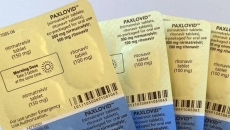Uber says regulation changes for ride-share and delivery workers in British Columbia will drive up costs and reduce demands for local restaurants, but Premier David Eby says complaining companies can "suck it up."
Uber issued a statement Thursday saying it supports some of the new rules coming in September, such as an increased minimum wage and health and safety coverage, but the amount it is being forced to pay workers for using a personal vehicle is "unreasonable."
At the same time, Unifor, the country's largest private-sector union, said B.C.'s changes are leading the way to enshrine the basic rights of gig workers.
The Ministry of Labour announced this week the first-in-Canada regulations will take effect on Sept. 3, including setting a minimum hourly wage for the time workers are engaged on the job at $20.88.
The rules also ensure 100 per cent of customers' tips go to the worker, that they are covered through B.C.'s workers' compensation agency and that they receive a 35- to 45-cent per-kilometre vehicle allowance.
Uber's statement said the changes would make the ride-share expense rate in B.C. 50 per cent higher than the comparable rate in California.
The company said it encourages "the government to reconsider the consequences for British Columbians who rely on ride-share and delivery."
Eby said at an unrelated news conference that companies can complain about the regulations, but they will not change.
"These companies can suck it up, they'll be alright, they'll be fine," he said.
Eby said British Columbians will use the service that is most cost competitive.
"And that may be any of those companies, or it may be some entirely different company that starts up in this province.”
The premier said he sometimes uses apps to get food delivered.
“There is no chance that I want my food brought to me by someone who has to use a food bank, or who, if they get attacked at work, isn't covered by WorkSafeBC,” he said, referring to the provincial worker-safety agency.
Eby said he doesn't want to see someone going further into debt because they have a car to pay for that isn't supported by their employer, "which are these app-based companies that have billions of dollars in revenue.”
Unifor western regional director Gavin McGarrigle said in a statement that gig workers are some of the most exploited and under-represented workers in B.C.'s economy.
Unifor said gig workers also deserve unique legal tools to form their own unions.
They say unionizing can be a struggle because of the lack of transparency around these types of companies' total local workforce.
Union votes are triggered in B.C. after 45 per cent of a certifiable group signs a union card.
"However, without accurate knowledge of the threshold, the organizing efforts are more likely to fail or stall. Unifor has lobbied for employers to be forced to provide a payroll list after 20 per cent of workers sign union cards," the union said.






